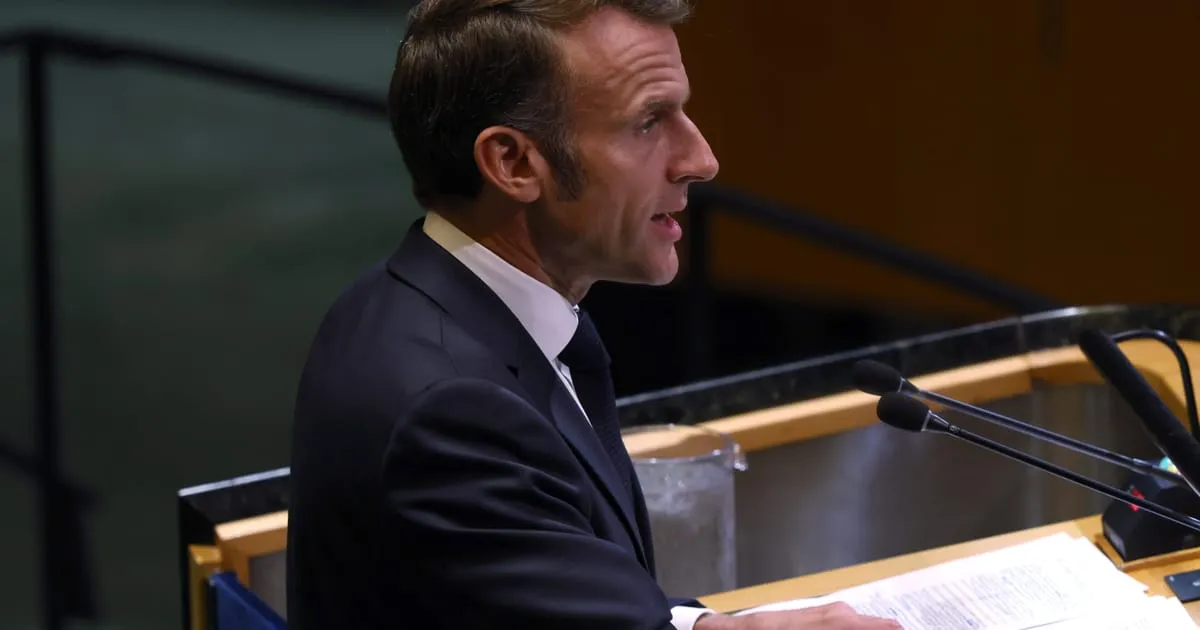
In a groundbreaking address at the United Nations General Assembly in New York, French President Emmanuel Macron declared France's recognition of the State of Palestine, igniting tension with both the United States and Israel. Macron stated, “France recognizes today the State of Palestine,” emphasizing the need for peace between the Israeli and Palestinian peoples. His speech underscored a passionate appeal for an immediate end to Israel's ongoing military operations in Gaza and called for the release of Israeli hostages held by the Hamas militant group.
During his speech, Macron articulated that “the time has come because the emergency is everywhere,” urging for a revival of the two-state solution to resolve the decades-long conflict between Israelis and Palestinians. He stressed, “The time for peace is now, because it will soon be too late to grab the moment.” His remarks come amidst escalating violence as Israel intensifies its ground offensive in Gaza, highlighting the urgency for global action.
Macron's push for the recognition of Palestinian statehood coincided with a broader diplomatic effort, as countries like the United Kingdom, Canada, and Australia also announced their recognition of a Palestinian state over the weekend. Other European nations, including Belgium, Portugal, Denmark, Luxembourg, Malta, San Marino, and Monaco, are anticipated to follow suit. The conference on Palestine was co-hosted by France and Saudi Arabia, although a last-minute change saw Saudi Crown Prince Mohammed bin Salman replaced by Foreign Minister Faisal bin Farhan, who condemned Israel's actions as “brutal crimes” against the Palestinian people.
Macron's successful lobbying for Palestinian statehood has thrust him into the global spotlight this week, positioning him as a key player in international diplomacy, even as he faces backlash from Israel and the U.S. Tensions have been rising between France and Israel, with Israeli officials indicating potential retaliatory measures against Paris. An anonymous Israeli official countered claims of Israel's international isolation, stating, “A large majority of the British, French, and Canadian public are against the recognition of a Palestinian terror state.”
Both the U.S. and Israel have expressed discontent with the growing support for the two-state solution. White House spokesperson Karoline Leavitt conveyed that the U.S. president “disagrees with” France's decision to recognize a Palestinian state, arguing that it does not contribute to the immediate goals of freeing hostages or resolving the conflict, and may inadvertently reward Hamas.
Prior to his speech, Macron engaged with delegates for about ten minutes, interacting with various leaders, including Syrian President Ahmed al-Sharaa and European Council President António Costa. He framed the recognition of Palestinian statehood not as a setback for Israel but as a strategic move to further Israel’s interests, particularly in facilitating the release of hostages held in Gaza. Macron highlighted the pressing need for nations to “open a pathway toward peace,” warning of dire consequences if the situation escalates further.
Macron defended his stance against claims that recognizing a Palestinian state would strengthen Hamas, asserting that the group is now “weakened” and must be politically defeated. He indicated that France sees the recognition of Palestinian statehood as a phased process, with careful consideration given to Palestinian commitments. Macron mentioned, “I would decide to open an embassy to Palestine once all the hostages in Gaza have been released and a ceasefire has been implemented.” Furthermore, he expressed France's readiness to contribute to a “stabilization mission” in Gaza if a ceasefire is achieved, hinting at the potential for an international presence in the region.
In a virtual address, Palestinian Authority President Mahmoud Abbas called for a ceasefire in Gaza and urged Hamas to “surrender its weapons” to the Palestinian Authority, reinforcing the call for a peaceful resolution to the ongoing conflict. This moment marks a significant chapter in the ongoing discourse surrounding Palestinian statehood and the quest for peace in the region.